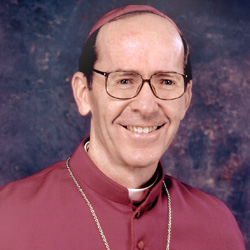 A particularly dramatic moment of human freedom occurs in a Catholic wedding when a man and woman stand before the altar and answer three “questions of clarification” about the nature of marriage, just before the vows are exchanged.
A particularly dramatic moment of human freedom occurs in a Catholic wedding when a man and woman stand before the altar and answer three “questions of clarification” about the nature of marriage, just before the vows are exchanged.
“Have you come here freely, and without reservation?” The couple answers, Yes.
“Will you honor each other as husband and wife for the rest of your lives?” Yes.
“Will you accept children lovingly from God, and bring them up according to the law of God and His Church?” Yes.
Our postmodern culture balks: “Wait! Is the third question really necessary? Certainly, we must be all about freedom, and unconditional love, yes, and even fidelity is an attractive ideal (if not realistic for most humans), but a promise to be open to children? Is this necessary to promises of marriage?”
“Yes,” says the Church, “it is entirely necessary.” The Church does not invent the meaning of marriage — she merely protects and promotes it, in all of its natural and sacramental beauty. At the center of the beauty of marriage is the gift of children, and of being a mother and a father.
In other words, when Pope Paul VI’s encyclical of 1968, Humanae Vitae, echoes the 2,000-year teaching of the Church, “…each and every marital act must of necessity retain its intrinsic relationship to the procreation of human life,” (no. 12) more than a clear teaching against contraception is taught, though that teaching is clear and unchangeable. For those that have “eyes to see and ears to hear,” an ennobling call from our mother the Church, and therefore from Christ Himself, is heard. It is the high call to married couples to reject the stultifying, fear-based shadow of marriage encouraged by the contraceptive mentality of our age; and, instead, to embrace the fullness of the call to marriage in all its life-giving splendor and dignity.
A person’s identity and the call to be life-giving
If the choice of sterility (I am not talking here about infertility, which I will discuss in the next article) were not in some odd sense attractive, it would not be such an effective lie, and it would not be chosen by so many today. What lurks always as a temptation near the human heart is the desire to be undeterred in one’s choices by any law outside of the self.
In his 1964 play “Radiation of Fatherhood,” a dramatic reflection on the Trinity and human freedom, the future John Paul II placed in the mouth of the mysterious character Adam the following expression, “Ah, to stand apart from everything, so that I could be only within myself!” Adam, not accidentally the Biblical word for man himself, fears the call to parenthood, to bring a child into existence, because he fears the death of his ego which this entails. He fears the suffering that will of necessity accompany becoming and being a father. And yet in the play, God calls him to become who he truly is by becoming a father. It turns out that there is no other path to human fulfillment than the path of fruitfulness, of motherhood and fatherhood.
“Become who you are!” Blessed John Paul II was fond of repeating to priests, consecrated persons, and parents. He knew the all-too-human fear to which we are subject in living our vocations, and he knew the antidotes.
‘Love and Responsibility,’ four spousal benefits
In his philosophical work on marital love, “Love and Responsibility,” the future Polish pope was concerned with explaining how spouses can engage in the marital act of sexual intercourse without falling into using each other, a situation he calls “the internal problem of every marriage.” The key is that a couple must understand the great meaning of what they are doing, and understand the possibility of motherhood and fatherhood in each act:
“Mutual betrothed love demands a union of persons. But the union of persons is not the same as sexual union. This (union) is raised to the level of the person only when it is accompanied in the mind and the will by acceptance of the possibility of parenthood… Neither in the man nor in the woman can affirmation of the value of the person be divorced from awareness and willing acceptance that he may become a father and she may become a mother… If the possibility of parenthood is deliberately excluded from marital relations, the character of the relationship between the partners automatically changes. The change is away from unification in love and in the direction of mutual, or rather, bilateral “enjoyment” (p. 228).
This quote from Blessed John Paul is theologically rich; let us focus only on one specific element of it. For the marital act to truly be a personal union it must include the activity of the powers of the soul which identify us as being human: intellect and will. For the marital act to retain its full meaning the spouses must rationally accept the full potential of the act: the possibility of becoming parents (this does not negate the legitimacy of abstaining during fertile periods, when there are good reasons for doing so). To deliberately not include this possibility would be to negate one of the essential goals of the marital act and to render the entire act sinful.
Such is the pattern of contraception in a marriage, and we see it in the brokenness of countless marriages today, in the radical cultural disconnect between sex and children on display everywhere, from soap operas to abortion. As priests, we feel the weight of it in the confessional and grieve the losses.
Yet, for those who generously accept the potentiality of motherhood and fatherhood in their marital love, benefits arise which our world desperately needs. Karol Wojtyla in “Love and Responsibility” points to four personal strengths which grow in married couples who are open to life, which I have simplified somewhat from Wojtyla’s dense philosophical language:
- Awareness of the call to parenthood assists growth in self-mastery;
- Marital love flourishes when the goodness of parenthood is understood;
- Raising a child teaches one to love, to make a gift of self; and
- Married persons understand their greatness as procreators with God of a new human person.
Blessed John Paul II insisted that if a couple wants a virtuous, happy, generous, awe-filled marriage, they must remain open to the natural end of the consummating act of marital love, open to the possibility that a child, a new person from God, might come into being through that act.
The drama and beauty of this calling is not lost on many of our young couples currently preparing for marriage in the Diocese of Phoenix; they share their gratitude for the clarity of Church teaching and for the witness of the couples who presented it. These couples are on a path to a joy-filled marriage, which deepens like any Christian vocation authentically lived.
In the final part of this series, I will consider the mission of the fruitful life of marriage, including the couple struggling with infertility.
—
Read “The blessing of a fruitful life; Part one: Blessed is the fruit of the womb”





![[VIDEO] Make Sunday feel like Sunday again](https://www.catholicsun.org/wp-content/uploads/2021/04/2021-YOUTUBE-BISHOP-MESSAGE-THUMBNAIL-ENGLISH-218x150.png)
